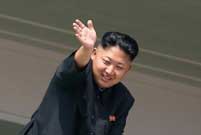 China's new-type guided missile frigate 'Bengbu' in live fire training
China's new-type guided missile frigate 'Bengbu' in live fire training
 Photo story: A primary school of only two people
Photo story: A primary school of only two people
 Flight team performs first show abroad
Flight team performs first show abroad
 The last days of Wan Aihua- a 'comfort woman' during the WWII
The last days of Wan Aihua- a 'comfort woman' during the WWII
 Top 10 private Chinese enterprises 2013
Top 10 private Chinese enterprises 2013
 'College campus queens' welcome the new students in Hunan
'College campus queens' welcome the new students in Hunan
TOKYO, Sept. 11 -- The Japanese government is pushing for high-level talks with China in a bid to calm an escalating standoff between the two countries concerning the disputed islands in the East China Sea, yet remarks made by the senior government officials here Wednesday may derail Japan's ambitions in this regard. After one year of Japan unilaterally "nationalizing" the Diaoyu Islands, relations between Tokyo and Beijing have soured to a degree not seen for decades.
But it would seem that the Japanese government is sending contradictory messages to Beijing -- on the one hand championing the need for the resumption of high-level talks on the matter, with Prime Minister Shinzo Abe seemingly hopeful that this will come to fruition soon -- yet on the other hand further straining ties by denying a dispute even exists and mulling ideas to post government officials on the disputed islands.
Abe held brief talks with Chinese President Xi Jinping on the sidelines of last week's summit of the Group of 20 (G20) in Russia, marking the first time the two leaders have had face-to-face talks since they both assumed office.
Furthermore, Japan believes that Abe may be able to hold further talks with Xi or Premier Li Keqiang on the sidelines of the Asia-Pacific Economic Cooperation (APEC) forum in Indonesia on Oct. 7 to 8.
But following remarks made by senior Japanese ministers, this now seems highly unlikely, with commentators now questioning Tokyo 's integrity in wishing to mitigate rising tensions with Beijing and leaving a number of pundits wondering whether calls for talks on Tokyo's part are just merely "diplomatic jockeying."
On Wednesday, Japan's Defense Minister Itsunori Onodera said surveillance had been increased in the disputed islands' area but opted not to provide further details at an impromptu press briefing in Tokyo.
But likely to incense Beijing, at a time when Tokyo is supposedly seeking increased dialogue and diplomacy with its neighbor, were his remarks made refuting that a dispute even exists between the two countries.
"China seems to be trying to give the impression that there is some kind of territorial issue, but our stance is that no issue of territorial sovereignty exists," the defense minister said, referring to the disputed islands.
Chief Cabinet Secretary Yoshihide Suga has similarly sent mixed messages, on the one hand calling on Chinese leaders to hold high- level talks and stating that Japan and China have a " responsibility to ensure peace and prosperity of the region and the world," yet on the other intimating a forceful response by Japan, if it deems an infraction to its perception of history and sovereignty has occurred.
"Even though there may be individual disputes between the two countries, the window for strategic dialogue will be open," Suga said Wednesday. "We will always keep the door open for China," the top government spokesperson added.
However, just days earlier Suga maintained that Japan stood prepared to make "a calm but resolute response to defend our territory," and asked whether Japan might station officials on the islands to defend its territory, Suga said the move was "one option under consideration".
Suga also stated unequivocally that "Japan will never make a concession on the matter of sovereignty," a comment that doesn't bode well for Japan's hopes for high level talks with China and also a comment that runs contrary to Japan's shifting stance on its sovereignty over disputed islands with Russia, located north of Hokkaido Prefecture.
Abe's talks with Xi in Russia may be viewed by Tokyo as a step in the right direction in attempting to defuse a rising conflict in the East China Sea, but uncompromising and abrasive remarks made by senior Japanese ministers on matters of questionable sovereignty, are surely tantamount to Tokyo taking two steps back from the negotiating table.
 DPRK holds military parade to mark 65th founding anniv.
DPRK holds military parade to mark 65th founding anniv. Highlights of MAKS 2013 Int'l Aviation and Space Show
Highlights of MAKS 2013 Int'l Aviation and Space Show  10th China-ASEAN Expo opens in Nanning
10th China-ASEAN Expo opens in Nanning Eagle Boy takes to sky to break another record
Eagle Boy takes to sky to break another record 12-year-old boy becomes pillar of the family
12-year-old boy becomes pillar of the family Eye-gouged boy receives blind rehabilitation in Shanxi
Eye-gouged boy receives blind rehabilitation in Shanxi Top 10 naked hotels in the world
Top 10 naked hotels in the world The most gorgeous Chinese women in the eyes of foreigners
The most gorgeous Chinese women in the eyes of foreigners A collection of bizarre rooftop buildings around China
A collection of bizarre rooftop buildings around China Residences of the royal house of Savoy
Residences of the royal house of Savoy China's frigate 'Bengbu'in fire training
China's frigate 'Bengbu'in fire training Fresh students 'forced' to register in university independently
Fresh students 'forced' to register in university independently 2013 Taiwan Int'l Tourism Expo kicks off in Taipei
2013 Taiwan Int'l Tourism Expo kicks off in Taipei Photo story: Take a gap year
Photo story: Take a gap year Nokia's Global Headquarters: visiting a declining empire
Nokia's Global Headquarters: visiting a declining empireDay|Week|Month